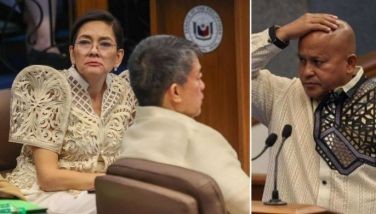Foreign poll observers for what?

In three weeks, we shall be having our national and local elections on May 12. But as early as a week ago, over 200 election observers from the European Union (EU) have arrived in our country to monitor the upcoming midterm elections. Supposedly, this was “upon the invitation of the Philippine government” for observers from 27 EU member-states, Canada, Norway and Switzerland to come here and witness for themselves, up close and personal, how we conduct our electoral processes.
Prior to the actual election day, the EU Election Observation Mission (EU EOM) Philippines 2025 consists of 72 “long-term observers” deployed last April 16 around the country. Additional EU observers will be deployed around election day, High Representative/Vice President of the European Commission Kaja Kallas announced. The EU EOM team will remain in the country until the completion of the election process.
“Following an invitation by the Philippines’ Commission on Elections, this will be the first deployment of an EOM in the country, marking a step toward stronger EU-Philippines relations,” the EU EOM disclosed in an official statement.
The International Election Observer Mission (IEOM) is described as “independent” from the EU institutions and EU member-states.
“It is committed to remaining neutral and to abide by the Declaration of Principles for International Election Observation and the Code of Conduct for International Election Observers, as well as the laws of the Republic of the Philippines,” the IEOM further declared.
A check with the office of the Commission on Elections (Comelec) Chairman George Garcia showed that EU EOM itself initiated this move sometime in October last year. Through our Department of Foreign Affairs-Office of European Affairs (DFA-OEA), an EU exploratory mission flew in November last year that made preparatory arrangements on the proposed deployment of election observers. The DFA-OEA invoked the United Nations Declaration of Principles of International Election Observation to which the EU and the Philippines are both signatories.
As relayed to the DFA-OEA, the IEOM is “interested” to observe the first-ever parliamentary elections in the Bangsamoro Autonomous Region in Muslim Mindanao and the separate national and local elections. But last February, President Ferdinand “Bongbong” Marcos Jr. signed a law that postponed the holding of the BARMM Parliament election originally synchronized with the May 12 elections and instead deferred it to Oct. 13 this year.
“The Mission focuses on key aspects of the electoral process, including the legal framework, the work of the election administration, the election campaign, the role of the media and social media, voting, automated counting, tabulation the of results and the resolution of election-related disputes,” EU EOM deputy chief observer Manuel Sánchez de Nogués explained.
De Nogués further explained the IEOM will observe the electoral process before, during and after the vote, while meeting with electoral officials, candidates, civil society representatives and the media. The mission is led by Chief Observer Marta Temido, a member of the European Parliament from Portugal who was expected to arrive in the Philippines last Monday night. Around 100 “short-term” observers will join the mission shortly before election day, to be joined by a delegation of European Parliament members and accredited diplomats. Thus, the total observation force will be comprised of more than 200 people.
According to the IEOM team here, they will issue a preliminary statement shortly after election day and they will remain in the Philippines until the end of May. Two to three months after the polls, the Chief Observer returns to the Philippines to present the final report on their assessment of the elections and recommendations for future elections.
This is purportedly “the first time it (EU) will do so in over two decades of conducting election observations worldwide.” The EU sends election observers to monitor and independently assess the conduct of polls in other countries as part of its foreign policy supporting democracy. It deploys an average of 30 electoral missions yearly with a €45-million budget. So the IEOM is paying for their own expenses here “at no cost” to our government. The Comelec merely issues accreditation passes to the EU EOM to allow them access to polling places.
The factsheet on EU EOMs states that “the EOM does not judge on the election outcome and does not in any way validate results, but assesses whether the electoral process was conducted in line with the international, regional and national obligations and commitments on the conduct of democratic elections that the country has signed up to.”
But here’s the usual EU bias: “The EU EOM observation is also wide-ranging and encompasses the respect for human rights and fundamental freedoms online and offline, in particular freedom of expression and assembly, the participation of women and youth and the situation of vulnerable groups (minorities, disabled persons, LGBTI) etc.”
Offhand, there is nothing wrong if foreign “observers” come to watch our elections. They would have “ringside” seats, so to speak, in watching how fiercely our politicians fight tooth and nail just to win in the elections. And the most hotly contested elections at times get settled through the barrels of the gun, goons and gold, or the so-called 3Gs. Hence, election-related violence erupts, most especially in areas of the country where known warlords still wield the power of life and death over the people.
This is not being overly dramatic. But it is what it is.
Thanks to a great degree to the adoption of the automated election system (AES) since the May 2010 presidential polls. The AES replaced the manual processes of voting, counting and canvassing that took ages before election winners were officially known and proclaimed. The faster turnaround of election results eased much of the election violence.
The advent of modernized elections though merely changed the money and scare tactics employed by unscrupulous politicians. It is no longer called 3Gs but has earned its new monicker as 3Fs that stands for “force, fraud and funds.”
But there is nothing extraordinary in Philippine elections that these international observer missions cannot also find in other countries.
- Latest
- Trending





























